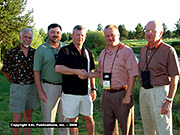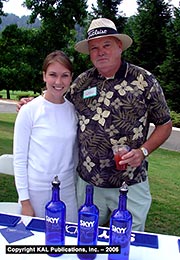
September 2005 Issue Highlights
For more complete coverage, send us an e-mail to
request a back issue.

For more complete coverage, send us an e-mail to
request a back issue.

Colorado-Wyoming Petroleum Marketers Association Convention and Trade Show

Oregon Petroleum Association Convention

RHL Golf Tournament
Want to see the photos that didn't make the issue? Check out
the Cutting Room
Floor.
Hawaii Enacts Gasoline Price Caps
Kinder Morgan to Upgrade Phoenix Pipeline
C-Store Clerk IDs Wanted Criminal
Bomb Threat Shuts Valero Terminal
HONOLULU, HI — On September 1, Hawaii's state government will proceed with its plan to enforce a maximum pre-tax wholesale price for regular unleaded gasoline.
Under the law, which was passed in 2004 and is being enacted now, no manufacturer, wholesaler or jobber may sell regular unleaded gasoline to a dealer retail station, an independent retail station or to another jobber or wholesaler at a price above the maximum pre-tax wholesale price.
A separate maximum pre-tax wholesale price will be set for each Hawaiian Island in an effort to take additional transportation costs into account. The price will be set by the Hawaii Public Utilities Commission (PUC) and posted on the agency's website.
The first week's prices have been set by the PUC for September 1-4. The prices —before state and federal taxes as well as any retailer margins have been added — range from $2.1578 for regular unleaded in Oahu to $2.4958 for regular unleaded on Lanai. Premium unleaded ranges from a cap of $2.2478 in Oahu to $2.5858 on Lanai.
The average price for gasoline on Hawaii the week prior to the gasoline caps was $2.84 per gallon for regular unleaded. The average price nationwide was $2.61, according to the Department of Energy.
It is worth noting that Hawaii's state gasoline taxes are some of the highest in the nation. In fact, the taxes in Maui County are the highest in the United States at 60 cents per gallon. When the taxes are added into the equation, even without any margin for the retailer, it appears that street fuel prices will be going up when the gasoline caps are enacted.
Officials at the Hawaii PUC agree. In statements made at the end of August, the PUC reported that industry experts predict the gasoline price caps will increase prices at the pump by 30 cents per gallon, bring fuel shortages to the Islands, and drive fuel jobbers out of business.
The law also gives the state Governor the authority to suspend the price caps if its enactment has an adverse effect on the economy. Governor Linda Lingle who has been an opponent of the price caps said, "I can tell you I won't hesitate to step in and stop it if I think it's hurting the economy or hurting the public health and welfare."
Lingle had been advocating public disclosure of oil companies' operating costs and profits in lieu of the price caps. "That's been an issue of inquiry and lawsuits," she explained. "It's a feeling people have that they're being gouged. I think that's what bothers people most, is that they feel they're being charged unfairly simply because we have no other choice."
High street prices for gasoline — and concerns over gouging — have been a subject of debate in the Islands for many years and led to the Legislature's action to adopt price caps. Hawaii traditionally has the highest gasoline prices in the United States.
Oil companies note, however, that transportation costs of both refined product and crude oil to the Hawaiian islands are substantially higher than to other states. They argue the higher street price generally reflects the increased cost of bringing product to the market.
Legislators conceded that transportation costs for bringing the fuel to Hawaii are higher but they believe the oil companies have been gouging consumers and the price caps will solve the problem.
Opponents of the price cap program note that major oil companies are generally searching for the best margins. If they are forced by the Hawaiian legislature to operate at a small profit — or even a loss — they will simply pull out of the market, leaving Hawaii with potential fuel shortages.
Tesoro and Chevron, the two majors operating refineries in Hawaii, have filed suit against the state's plan. The companies claim that the transportation margins the state allows are too low and may force local Hawaiian companies out of business.
In an official statement, Tesoro predicted that the price cap "will only serve to distort market forces and will result in long-term negative impacts to the citizens and economy of Hawaii."
State House Speaker Calvin Say stated that he believes the price caps may have a negative effect in the short-term on prices in the state but "we should give it a chance to see how it goes."
State House Majority Leader Marcus Oshiro (D-Wahiawa) told local reporters that if the price caps fail, he believes Hawaiians will appreciate the fact the state legislature tried and failed "than not to have tried and allowed the oil companies to gouge consumers," adding, "The community knows that we are trying to address high gas prices."
PHOENIX, AZ. — Kinder Morgan has announced that it plans a "major upgrade" to its pipeline system in the Southwest. The company predicted that when the project is complete — expected in 2007 — it will increase the supply of fuel to Arizona by 40%.
Kinder Morgan said it will replace the rest of its older 12-inch-diameter pipeline from El Paso to Tucson with a 16-inch pipe at a cost of $130 million. Kinder Morgan estimates that the new pipeline will more than double the volume of gasoline shipped to Arizona from refineries in Texas and the Gulf Coast to approximately 170,000 barrels per day.
To handle the increased volume, the company will also build a new tank farm outside of El Paso, TX.
The company is already working on installing a new 12-inch pipeline from Tucson to Phoenix, a $210 million project.
"We see continued demand for more capacity in Arizona," said Tom Bannigan, president of Kinder Morgan's pipeline division. "From our perspective, we think boosting the supply of the East Line makes the most sense."
Kinder Morgan spokesman Jay Thorne added that the extra capacity will give fuel marketers "more choices and more choices means the ability to negotiate lower-priced deals."
WALLACE, ID. — An alert Conoco convenience store clerk led to the arrest of a convicted rapist on the run after allegedly stabbing his 12-year-old daughter.
According to local police reports, Conoco clerk Sue Boren became suspicious when a dirty man, wearing camouflage clothes and a red bandanna, came into the c-store and requested a package of cold hot dogs. When she would not sell him the complete package — and he refused her offer of a cooked hot dog — he left the store empty-handed and she called 911.
"It is not hunting season," she told reporters. "I thought something was suspicious about him." She said she offered him the hot dog as a way of getting a better look at his face to compare it with wanted posters she had seen from the police search.
"As soon as he walked out of the store and I didn't see a vehicle, I thought I better give the sheriff's office a call," Boren said. "They picked him up a couple blocks away."
Police responded to the scene where they arrested John R. Tuggle, a man being sought by authorities in the Idaho mountains for attempted murder. He had been sought since his daughter, who he said he was taking out shopping, was found stabbed five times, bound and left for dead in a remote area.
"He ate two full plates of food and is resting in solitary," said Sheriff Chuck Reynalds, adding, "he said he had not eaten in three days. So much for living in the wilds of northern Idaho. Apparently he was not as proficient as he thought he was."
CROCKETT, CA. — A woman claiming to have a bomb in her car drove through the gate at the Valero terminal in Northern California. Her actions shut down the terminal for several hours while the facility was evacuated and negotiators worked with the woman to get her to surrender to authorities.
According to local police reports, Lynda Kennedy, 36, waited in her car outside the terminal along adjacent San Pablo Avenue until a tanker truck approached the gate for entrance at approximately 6:20 p.m. After the tanker drove into the terminal, Kennedy followed the truck in before the gate could drop.
Inside the gate, a Valero employee tried to block her progress with his truck but she was able to drive around it. At this point, the terminal employees surrounded the car and told Kennedy to leave the facility. She refused to leave the terminal and, instead, parked her car and said she had a bomb.
Sheriff Lieutenant Alan Johnson said that Kennedy "displayed some sort of triggering or push-button device with a wire trailing from it" to the terminal employees. Valero responded by evacuating the facility and calling several local agencies for assistance including police and fire departments. In addition, a fire crew from the ConocoPhillips refinery also responded to the threat.
Kennedy surrendered to the police an hour later after talking to a sheriff's hostage negotiator. A search of her 2002 BMW found no explosives or weapons and it was determined that the device she claimed was a detonator was a cell phone charger.
Kennedy revealed no reason for her actions at the terminal which resumed operations shortly after the incident.
Kennedy was arrested on suspicion of making terrorist threats and trespassing. She is being held in Martinez, CA., on $75,000 bail.
Originally published in the September 2005 issue of
O&A Marketing News.
Copyright 2005 by KAL Publications Inc.
Serving the 13 Western States, the World's Largest Gasoline, Oil, Fuel, TBA and Automotive Service Market